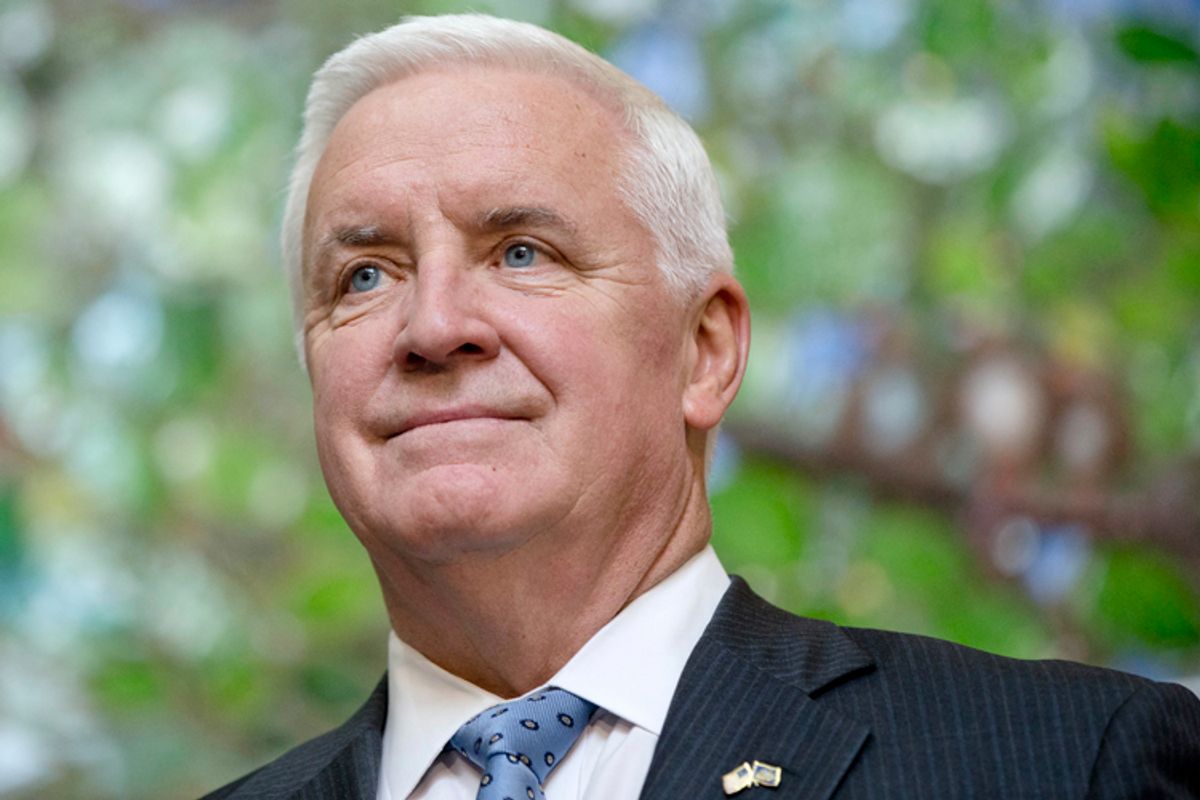With the important caveat that there are still just under five weeks before Election Day, it looks like congressional Democrats won’t be having a particularly good night on November 4. Republicans are a lock to retain the House majority, while the GOP is currently a slight favorite to wrest control of the Senate from the Democrats. But Democrats are likely to have at least one bright spot on Election Day – the battle for control of governor’s mansions.
Thirty six gubernatorial elections will be held across the country this year, and Politico notes this morning that Democrats are investing heavily in key contests. The rationale is twofold. First, given the gridlock plaguing Washington, states have gained renewed attention as centers of policy action. What’s more, Democrats actually stand a decent chance of adding to its gubernatorial ranks this year.
As Politico points out, incumbent Democrats in Illinois, Connecticut, and Colorado face close races this year, but many more Republican incumbents are either facing formidable challenges or, in the case of Pennsylvania Gov. Tom Corbett, virtually certain to lose. Political analyst Jennifer Duffy told the site that she predicts a net Democratic pick-up of two to four gubernatorial seats in November.
That dovetails with recent polling; RealClearPolitics’ survey averages have Democrats slated to pick up a net two seats, for a total of 22 governor’s mansions against 27 for the Republicans. (In Alaska, a Democratic Party-endorsed independent is currently leading Republican Gov. Sean Parnell in the polls.) RCP currently predicts Democrats will oust GOP incumbents in Pennsylvania, Florida, Kansas, and Maine, while Republicans will pick up Democratic-held governor’s seats in Arkansas, Colorado, and Connecticut. Most of the races, though, are exceedingly close – especially the contests in Florida, Maine, and Colorado. The site currently lists 13 governor’s races as pure tossups.
In other midterms news:
- Even as Democrats express optimism about their gubernatorial chances elsewhere, the momentum appears to be shifting away from the party in Massachusetts, where Democratic Gov. Deval Patrick opted not to seek a third term. RCP’s polling average currently shows the race between Democrat Martha Coakley and Republican Charlie Baker dead even; Coakley had been ahead by double digits earlier in the campaign. Meanwhile, the Boston Globe reports this morning that Coakley’s campaign finds itself increasingly starved for cash. Baker’s campaign, the Globe reports, has more than $1.5 million on hand, against Coakley’s $266,000. According to the Globe, Coakley’s campaign is asking Democrats in Massachusetts’ congressional delegation to lend her campaign financial assistance, and not all of them have been keen to do so.
- A new poll that shows Democratic Sen. Jeanne Shaheen of New Hampshire running even with GOP challenger Scott Brown is likely to generate buzz, but FiveThirtyEight’s Harry Enten cautions us not to read too much into it. The pollster, New England College, has been notably erratic – just two weeks ago, it showed Shaheen with an 11-point lead. Most other polls have shown Shaheen with a lead in the mid-to-high single digits. Moreover, the New England poll showed New Hampshire Gov. Maggie Hassan leading her GOP challenger by just four points; that’s a sharp departure from other surveys, which have given Hassan a double-digit advantage.
- A federal appeals court on Wednesday delayed implementation of restrictive voting measures passed by North Carolina’s GOP-dominated legislature. The Fourth Circuit Court of Appeals reinstated same-day registration and will allow out-of-precinct provisional voting, the Washington Post reports. The ruling did not, however, restore the seven days of early voting ended by the legislature. The delay of the restrictions means that they won’t be in place on Election Day this year and could help Democratic Sen. Kay Hagan hold on to her fiercely-contested seat. Hagan is counting on strong turnout among African-American voters, who are disproportionately harmed by restrictive voting measures.



Shares